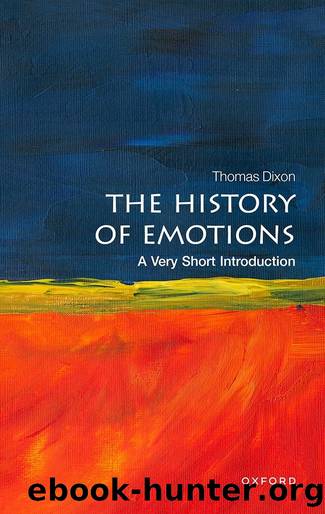The History of Emotions by Thomas Dixon

Author:Thomas Dixon [Dixon, Thomas]
Language: eng
Format: epub
ISBN: 9780192550408
Publisher: OUP Oxford
Published: 2023-03-13T00:00:00+00:00
What was happiness in 1776?
In the 18th century, as today, people could mean different things when they talked about âhappinessâ. The ancestry of the idea of happiness as an emotional state that can be measured numerically in wellbeing surveys is to be found in the figure of the English thinker and social reformer Jeremy Bentham, founder of the philosophy of Utilitarianism. His key idea was that the aim of all individual actions and government policies should be to secure âthe greatest happiness of the greatest numberâ. Bentham thought of this âhappinessâ in both an emotional and a mathematical way. It was the surplus of pleasures over pains and, in theory at least, those states of feeling could be quantified and measured.
Benthamâs philosophy gained more supporters during the 19th century but his was not the most influential understanding of happiness in the era of the American and French Revolutions. To find that we need to look instead at the Declaration of Independence adopted by the 13 original âunited States of Americaâ at the Second Continental Congress in Philadelphia on 4 July 1776. The document was drafted by Thomas Jefferson and edited by a committee whose members included John Adams and Benjamin Franklin. After a preliminary opening sentence about the need to break the historic bonds between one people and another, the text famously proceeds:
We hold these truths to be self-evident, that all men are created equal, that they are endowed by their Creator with certain unalienable Rights, that among these are Life, Liberty and the pursuit of Happiness.
The declaration goes on to affirm the intention of the people of the newly independent states to form for themselves a government on such principles that âshall seem most likely to effect their Safety and Happinessâ.
Happiness, then, was a central ideal for the newly founded United States of America. But what kind of âhappinessâ did Jefferson and his colleagues have in mind? It was something quite different from Benthamâs measurable state of feeling, and it had its roots in older, non-emotional meanings of the term. The âhapâ in âhappinessâ is the same as the âhapâ in âperhapsâ and âhappenstanceâ. In other words, it refers to luck, or chance, rather than to emotions. In some contexts, that meaning is still preserved, as when we refer to a âhappy coincidenceâ. To be happy in this sense is to be lucky, to enjoy good fortune. Among the other non-emotional uses of âhappinessâ is the way it has been defined in philosophical and political contexts to refer to the broadest aims of human life. âHappinessâ is sometimes used, for instance, to translate the ancient Greek eudaimonia, a term for human flourishing. To achieve eudaimonia was to live successfully, which, for Aristotle and others, meant living in accordance with virtue and reason.
The kind of âhappinessâ that the founders of the United States had in mind was within this non-emotional group of meanings. One clue pointing towards this interpretation is a short essay, âOn True Happinessâ, written by Benjamin Franklin and published in the Pennsylvania Gazette some decades earlier.
Download
This site does not store any files on its server. We only index and link to content provided by other sites. Please contact the content providers to delete copyright contents if any and email us, we'll remove relevant links or contents immediately.
american english file 1 student book 3rd edition by Unknown(618)
Phoenicians among Others: Why Migrants Mattered in the Ancient Mediterranean by Denise Demetriou(613)
Verus Israel: Study of the Relations Between Christians and Jews in the Roman Empire, AD 135-425 by Marcel Simon(595)
Basic japanese A grammar and workbook by Unknown(586)
Caesar Rules: The Emperor in the Changing Roman World (c. 50 BC â AD 565) by Olivier Hekster(582)
Europe, Strategy and Armed Forces by Sven Biscop Jo Coelmont(525)
Give Me Liberty, Seventh Edition by Foner Eric & DuVal Kathleen & McGirr Lisa(502)
Banned in the U.S.A. : A Reference Guide to Book Censorship in Schools and Public Libraries by Herbert N. Foerstel(492)
The Roman World 44 BC-AD 180 by Martin Goodman(480)
Reading Colonial Japan by Mason Michele;Lee Helen;(472)
Introducing Christian Ethics by Samuel Wells and Ben Quash with Rebekah Eklund(470)
DS001-THE MAN OF BRONZE by J.R.A(469)
Imperial Rome AD 193 - 284 by Ando Clifford(459)
The Dangerous Life and Ideas of Diogenes the Cynic by Jean-Manuel Roubineau(459)
The Oxford History of World War II by Richard Overy(456)
Catiline by Henrik Ibsen--Delphi Classics (Illustrated) by Henrik Ibsen(448)
Language Hacking Mandarin by Benny Lewis & Dr. Licheng Gu(416)
Literary Mathematics by Michael Gavin;(411)
Brand by Henrik Ibsen--Delphi Classics (Illustrated) by Henrik Ibsen(406)
